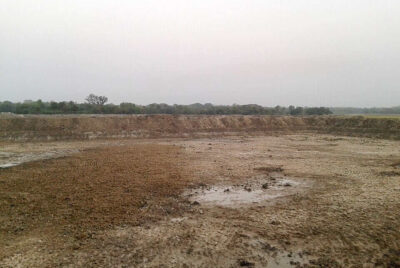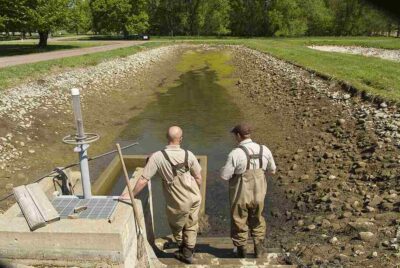How Much Does It Cost to Stock a Pond
Ponds are tranquil havens that can greatly enhance the aesthetic appeal of your property while providing a recreational outlet for fishing enthusiasts. If you’ve been contemplating the addition of a pond to your landscape, or if you’re considering restocking an existing one, you’ve likely wondered: just how much does it cost to stock a pond?
The cost of stocking a pond can vary widely. It depends on a multitude of factors, including the types and sizes of fish you choose, the company you hire for the job, and whether or not you meet the minimum purchase requirements. In this comprehensive guide, we’ll delve into the specifics of these costs and provide you with a clearer picture of what you can expect to spend on stocking your pond.
Fish Pond Stocking Prices
The cost of stocking a pond with fish can range from about $800 to $1,500 per acre for a new pond. When it comes to a 10-acre pond, the average cost escalates to between $8,000 and $15,000. The prices of individual fish species can also vary, for instance:
- Largemouth bass may cost between $0.90 to $17.00 per fish.
- Bluegill prices range from $0.40 to $7.00 per fish.
Let’s dive deeper and examine the average costs associated with stocking a pond of various sizes.
Cost Breakdown by Pond Size
¼ Acre Pond
- Average Cost: $170 – $500
- Package Includes:
- 100 – 125 prey fish (bluegill, hybrid bluegill, redear sunfish)
- 15 – 25 channel catfish
- 20 – 25 largemouth bass
- 1 – 5 lbs. fathead minnows
- 1 – 2 triploid grass carp
½ Acre Pond
- Average Cost: $400 – $700
- Package Includes:
- 200 – 250+ prey fish (bluegill, hybrid bluegill, redear)
- 25 – 50 channel catfish
- 40 – 50+ largemouth bass
- 2 – 10 lbs. fathead minnows
- 2 – 4 triploid grass carp
¾ Acre Pond
- Average Cost: $500 – $1,000
- Package Includes:
- 300 – 650 prey fish (bluegill, hybrid bluegill, redear)
- 50 – 75 channel catfish
- 60 – 75 largemouth bass
- 4 – 20 lbs. fathead minnows
- 3 – 6 triploid grass carp
1 Acre Pond
- Average Cost: $800 – $1,500
- Package Includes:
- 500 – 1,000 prey fish (bluegill, hybrid bluegill, redear sunfish)
- 50 – 100 channel catfish
- 50 – 100 largemouth bass
- 5 – 20+ lbs. fathead minnows
- 5 – 8 triploid grass carp
2 Acres Pond
- Average Cost: $1,600 – $3,000
- Package Includes:
- 1,000 – 2,000 prey fish (bluegill, hybrid bluegill, redear sunfish)
- 100 – 200 channel catfish
- 100 – 200 largemouth bass
- 10 – 40+ lbs. fathead minnows
- 10 – 16 triploid grass carp
3 Acres Pond
- Average Cost: $2,400 – $4,500
- Package Includes:
- 1,500 – 3,000 prey fish (bluegill, hybrid bluegill, redear sunfish)
- 150 – 300 channel catfish
- 150 – 300 largemouth bass
- 15 – 60+ lbs. fathead minnows
- 15 – 24 triploid grass carp
10 Acres Pond
- Average Cost: $8,000 – $15,000
- Package Includes:
- 5,000- 10,000 prey fish (bluegill, hybrid bluegill, redear sunfish)
- 500 – 1,000 channel catfish
- 500 – 1,000 largemouth bass
- 50 – 200+ lbs. fathead minnows
- 50 – 80 triploid grass carp
The prices listed above are average costs. Your actual cost may vary based on your location, the specific species you want, and the size and number of fish you need.
Fish Stocking Prices by Species
Each species of fish comes with its own average cost per fish. Here’s a quick rundown of some common species of fish and their average prices:
- Largemouth Bass: $0.90 – $17.00
- Striped Bass: $2.00 – $5.00
- Smallmouth Bass: $8.00 – $20.00
- Black Crappie: $0.50 – $2.00
- Bluegill (standard, coppernose, hybrid): $0.40 – $7.00
- Channel Catfish: $0.60 – $2.80
- Redear Bream/Sunfish: $0.50 – $3.00
- Triploid Grass Carp: $11.00 – $19.00
- Trout: $1.50 – $5.50
- Walleyes: $1.60 – $3.20
- Yellow Perch: $0.90 – $3.40
- Koi: $10.00 – $60.00+
- Fathead Minnows: $9.00 – $13.00 per pound
- Golden Shiners: $10.00 – $16.00 per pound
- Tilapia: $12.00 – $18.00 per pound
These prices are for new pond stocking. The recommended ratio of prey to predator for stocking is 10:1. The exact number of each species to stock will depend on factors such as location, species combination, individual fish size, whether the fish will be fed, and if the pond is fertilized. It’s best to consult a local fish biologist to find the right combination and quantity of fish species for your pond’s size, location, and purpose.
Cost of Stocking Specific Fish Species
Now, let’s go into more detail on the costs of stocking specific species of fish in your pond.
Stocking a Pond with Bass
The cost to stock a pond with bass ranges from $0.90 to $17.00 per fish, depending on the fish size. For a new pond, you would typically stock 50 to 100 bass per surface acre if they’re fingerlings, or 5 to 6 per acre if they’re adults. Overstocking bass can lead to stunted growth. Here’s a look at the average price to stock a pond with bass based on bass length:
- 2″ – 4″: $0.90 – $1.60
- 4″ – 6″: $1.90 – $3.50
- 6″ – 8″: $3.10 – $5.30
- 8″ – 10″: $4.80 – $9.70
- 10″ – 12″: $9.00 – $12.00
- Over 12″: $13.00 – $17.00
Bluegill Stocking Prices
If you’re stocking your pond with bluegill, it’ll cost you between $0.40 and $7.00 per fish, depending on the length. You’d typically stock between 500 and 1,000 bluegill per acre. Here’s a look at bluegill stocking prices based on size:
- 1″ – 2″: $0.40 – $0.60
- 2″ – 4″: $0.70 – $1.00
- 4″ – 6″: $0.90 – $2.10
- 6″ – 8″: $2.60 – $7.00
There are two types of bluegills you can consider:
- Standard Bluegills: These are prolific breeders, and you’d need a substantial predator population like bass or catfish to prevent overpopulation. A large number of bluegill sunfish are necessary to foster a healthy bass population.
- Hybrid Bluegills: These are a cross between a female green sunfish and male bluegill. They grow larger and are more aggressive than standard bluegills, but their lower reproductive rate often requires periodic restocking.
Cost of Stocking Minnows in a Pond
The cost to stock minnows in a pond averages between $9 and $13 per pound. Typically, a pound contains 200 to 300 minnows. Some retailers sell minnows in 1,000-fish batches instead, which costs around $0.03 to $0.10 per fish.
Catfish Pond Stocking Cost
The cost to stock a pond with catfish can range from $0.60 to $4.00 per fish, depending on the size. For a catfish pond, you would typically stock up to 200 catfish per surface acre. Here’s a look at catfish pond stocking prices based on catfish length:
- 4″ – 6″: $0.60 – $0.90
- 6″ – 8″: $0.70 – $1.60
- 8″ – 10″: $1.30 – $2.80
- 10″ – 12″: $1.80 – $4.00
Grass Carp Prices
The prices for grass carp range from $6 to $19 per fish, depending on the type. Triploid grass carp or white amur are sterile fish commonly used as a natural weed control alternative.
Additional Cost Factors
The factors that can affect the cost of stocking a pond include:
- Fish size & type: Prices vary depending on the species and size of the fish.
- Pond size & depth: The larger the pond, the more fish are needed to develop a sustainable habitat.
- Location / delivery fees: Most fisheries charge $2 to $5 per mile for fish stock delivery.
- Minimum order: Many fish stocking companies require an $800 to $2,000 minimum for stock delivery.
- Bagging fees: Fisheries charge $1.00 to $2.50+ per bag to bag the fish with oxygen for transport.
- Permits: Most areas require a permit to build a fish pond.
- Pond condition: Existing ponds may require a professional to assess the pond’s current habitability and remove wild fish before stocking.
- Season: Fish species availability varies by season and location.
Restocking an Established Pond
If you’re restocking an established pond, the cost will depend on the pond’s current condition and the existing fish population. An electrofishing survey, which temporarily stuns fish to assess the number, type, age, and health of the existing fish, can cost $650 to $2,000+. Water testing, especially if you’re restocking due to a fish kill, can cost $100 to $200.
Frequently Asked Questions
What is a stock pond?
A stock pond or stocking pond can be used for recreation, fishing, livestock support, or attracting and preserving wildlife. The cost to build a pond is $1,200 to $6,800 per acre, not including the fish.
When should I stock my pond with fish?
You should stock your pond with forage fish like bluegill, sunfish, fathead minnows, and golden shiners in early fall to late winter. Sportfish like bass and catfish should be stocked in spring or when temperatures are at least 65°F.
What fish to stock in a farm pond?
The best fish to stock in a farm pond are largemouth bass, bluegill, redear sunfish, and channel catfish.
Conclusion – (How Much Does It Cost to Stock a Pond)
Understanding the cost to stock a pond with fish is a crucial step in maintaining a healthy and thriving pond ecosystem. The expense can vary greatly depending on various factors, including the size of the pond, the types of fish you want to introduce, and the supplier you choose. However, by carefully considering these factors and consulting with professionals, you can create an aquatic haven that provides relaxation and enjoyment for years to come.
Frequently Asked Questions
Q: Can I stock my pond with fish from another body of water?
A: While it’s legal in some places to transfer fish from one body of water to another, it’s not always a good idea. It can introduce diseases or parasites into your pond, and it’s hard to control the quality of the fish.
Q: What is the best time of year to stock a pond?
A: The best time to stock your pond with forage fish (like bluegill and sunfish) is in the early fall to late winter, and with sportfish (like bass and catfish) in the spring or when temperatures are at least 65°F.
Q: How many fish should I stock in my pond?
A: The number of fish you should stock in your pond depends on its size and the types of fish you’re introducing. As a general rule, you should aim for a 10:1 prey-to-predator ratio.
Q: What type of fish is best for a pond?
A: The best fish for a pond will depend on what you want from your pond. If you’re interested in fishing, largemouth bass, bluegill, redear sunfish, and channel catfish are popular choices.
Q: How can I save money when stocking my pond?
A: Buying more fish at once can often save you money as many suppliers offer discounts for larger orders. Also, consider the long-term health and sustainability of your pond, as a well-maintained pond will require less restocking and maintenance in the future.




